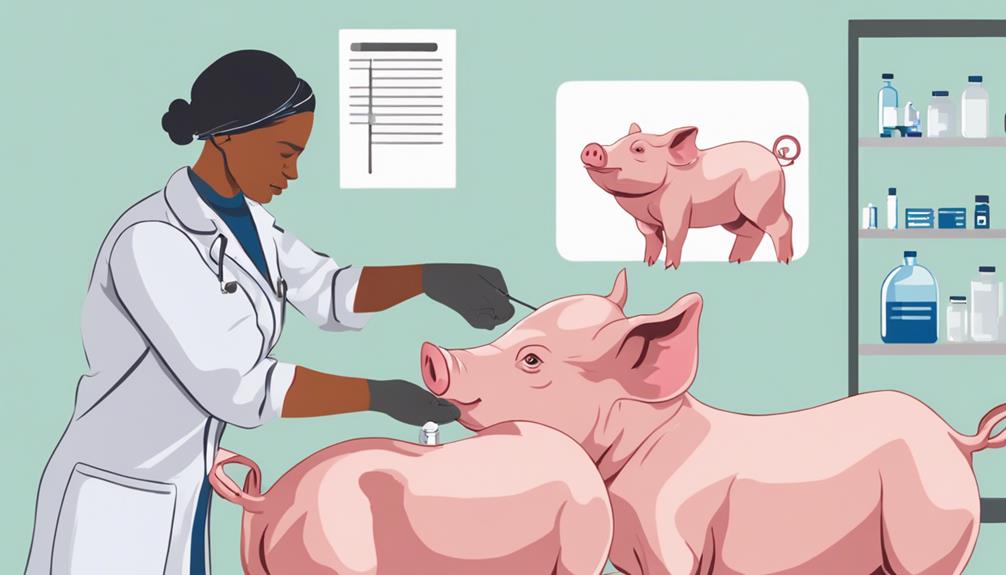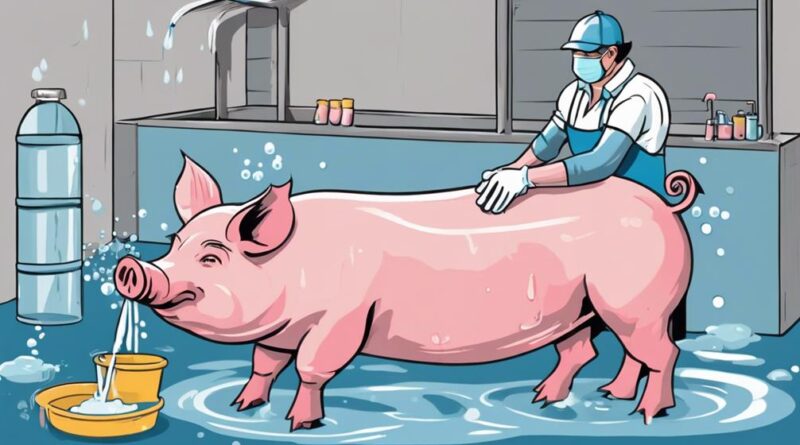Hygienic Practices for Disease Prevention in Pigs
Imagine your pig farm as a fortress, where meticulous practices act as the shields protecting your valuable livestock. From stringent cleaning routines to strategic waste management, each step plays a crucial role in safeguarding your pigs from diseases.
But there's more to this defense strategy that goes beyond surface-level cleanliness. By understanding the intricate dance between hygiene and disease prevention, you will unlock the secrets to ensuring the health and well-being of your pig population.
Importance of Pig Hygiene
Maintaining proper hygiene practices is crucial for ensuring the health and well-being of pigs on the farm. By focusing on environmental enrichment and stress reduction, you can create a conducive atmosphere for your pigs. Providing a stress-free environment through activities and objects that stimulate natural behaviors is essential. This can include items like hanging toys, rooting materials, or structures for climbing and exploring. Such enrichment not only reduces stress but also promotes herd health by preventing negative behaviors that arise from boredom or frustration.
In addition to environmental enrichment, nutrition management plays a vital role in pig hygiene. Ensuring your pigs receive a balanced diet with appropriate nutrients is key to their overall health. A well-rounded nutrition plan supports their immune system, making them less susceptible to diseases. Regularly monitoring their food intake and adjusting the diet as needed is crucial for maintaining optimal health and preventing illnesses.
Cleaning and Disinfection Procedures
Effective cleaning and disinfection procedures are essential for maintaining optimal hygiene standards in pig farming. To ensure the health and well-being of your pigs, follow these key practices:
- Establish a Cleaning Schedule: Create a regular cleaning schedule to keep your pig facilities free from harmful pathogens. Consistency is key in preventing disease outbreaks.
- Utilize Efficient Methods: Use efficient cleaning methods to save time and resources while effectively removing dirt and pathogens. High-pressure washers and foaming equipment can be excellent tools for this task.
- Implement Proper Disinfection Techniques: Choose the right disinfectants and apply them correctly to kill bacteria and viruses. Make sure to follow the manufacturer's instructions for the best results.
- Use Proper Tools: Equip yourself with the appropriate tools for cleaning and disinfection, such as brushes, mops, and sprayers. Having the right equipment can make the process more effective.
- Monitor and Evaluate Cleaning Procedures: Regularly assess the cleanliness of your pig pens and facilities to ensure that your cleaning and disinfection procedures are working effectively. Make adjustments as needed to maintain high hygiene standards.
Personal Protective Equipment (PPE)
To safeguard yourself from potential exposure to harmful pathogens during cleaning and disinfection procedures, ensure proper utilization of Personal Protective Equipment (PPE). Proper selection and training on the appropriate PPE is crucial to minimize the risk of infection transmission. When choosing PPE, consider the specific tasks involved, the level of protection required, and the comfort of the equipment to ensure it's worn consistently.
Proper PPE use is essential. Before starting any cleaning or disinfection process, make sure to wear the necessary gear, such as gloves, masks, goggles, and coveralls. Ensure that the PPE fits well and covers all exposed skin to prevent any contact with potentially infectious materials. Additionally, follow guidelines for PPE disposal to avoid contamination after use.
Training on the correct donning and doffing procedures of PPE is vital to prevent self-contamination. Regularly review and practice these procedures to maintain proficiency and ensure maximum protection. Remember, PPE is only effective when used correctly.
Quarantine and Biosecurity Measures
Implementing strict quarantine and robust biosecurity measures is paramount in preventing the spread of diseases among pig populations. To effectively control infectious diseases and minimize the risk of outbreaks, it's crucial to adhere to specific protocols and procedures:
- Quarantine Protocols: Establish designated areas for new pig arrivals to undergo a quarantine period before being introduced to the main population. This helps in identifying and isolating any potential carriers of diseases.
- Biosecurity Measures: Implement stringent biosecurity protocols such as controlling access to the pig farm, maintaining cleanliness, and limiting contact with other animals to reduce the risk of disease transmission.
- Isolation Procedures: In case of a suspected disease outbreak, promptly isolate sick pigs from the rest of the herd to prevent further contamination and spread of the illness.
- Regular Health Checks: Conduct routine health checks on all pigs to detect any signs of illness early on and take necessary actions to prevent the disease from spreading.
- Visitor Restrictions: Limit the number of visitors to the farm and enforce strict disinfection procedures to reduce the chances of introducing pathogens to the pig population.
Waste Management Practices
Maintaining proper waste management practices is crucial for ensuring the cleanliness and health of your pig farm. Effective waste disposal not only prevents foul odors but also minimizes the environmental impact of your operations. Implementing a systematic waste management plan will help control odors and reduce the attraction of flies to your farm.
To start, consider separating solid and liquid waste to facilitate easier disposal. Regularly remove solid waste from pens and dispose of it properly to prevent the buildup of harmful bacteria and odors. Utilizing composting techniques for organic waste can help manage nutrient levels and reduce environmental contamination. Additionally, incorporating effective drainage systems can aid in controlling liquid waste and preventing it from seeping into the ground.
Investing in odor control measures such as using natural additives or ventilation systems can significantly reduce unpleasant smells around the farm. Implementing fly management strategies like traps or biological control methods can help keep fly populations in check, decreasing the likelihood of disease transmission. Regularly monitoring waste management practices and making adjustments as needed will ensure a cleaner and healthier environment for your pigs while also minimizing the impact on surrounding ecosystems.
Water Quality and Sanitation
How can you ensure the water quality and sanitation standards on your pig farm are maintained at optimal levels? Ensuring clean water is crucial for the health and well-being of your pigs. Here are some key practices to help you maintain high water quality and sanitation standards:
- Regularly clean water troughs and pipelines to prevent biofilm formation, which can harbor harmful bacteria and contaminate the water supply.
- Monitor water sources for any signs of contamination and promptly address any issues to prevent the spread of waterborne pathogens.
- Implement a water testing schedule to check for pH levels, microbial contamination, and the presence of any harmful substances that could affect pig health.
- Install appropriate water filtration systems to remove impurities and ensure that the water provided to the pigs is clean and safe for consumption.
- Train staff members on proper water management practices to maintain consistent quality standards and prevent any lapses that could compromise pig health.
Vaccination Protocols for Disease Prevention

To effectively protect your pigs from diseases, establish and adhere to proper vaccination protocols. Vaccinations play a crucial role in safeguarding the health of your herd by enhancing herd immunity and minimizing the risk of disease outbreaks. Understanding the vaccination effectiveness for different diseases is key to developing a robust vaccination schedule.
When designing your vaccination protocols, consider factors such as the age and health status of your pigs, as these can influence the timing and type of vaccines required. Work closely with a veterinarian to tailor a vaccination plan that suits your specific herd's needs. Regularly review and update this plan to ensure ongoing protection against prevalent diseases.
In the unfortunate event of a disease outbreak, swift containment strategies are essential to prevent further spread within the herd. Vaccinated pigs can still contract diseases, but their symptoms are often milder, reducing the overall impact on the herd. By combining vaccinations with effective biosecurity measures, you can significantly reduce the likelihood of widespread infections.
Monitoring and Surveillance Systems
When ensuring the health of your pig herd, implementing robust monitoring and surveillance systems is essential for early detection of potential disease threats. Proper disease detection and health monitoring are crucial components of maintaining a healthy pig population.
To effectively monitor and surveil your pigs, consider the following:
- Regular Health Checks: Schedule routine health checks to observe the overall well-being of your pigs and detect any signs of illness early on.
- Diagnostic Testing: Conduct regular diagnostic tests to screen for common pig diseases and identify any potential health issues promptly.
- Environmental Monitoring: Keep a close eye on the pig's living conditions, such as temperature, ventilation, and cleanliness, as these factors can impact their health.
- Behavioral Observation: Monitor the behavior of your pigs daily to spot any changes that could indicate sickness or distress.
- Record Keeping: Maintain detailed records of health observations, test results, and any treatments administered to track the health history of each pig accurately.
Frequently Asked Questions
Can Pigs Be Carriers of Diseases That Can Affect Humans?
Pigs can indeed carry diseases that are transmissible to humans, posing zoonotic risks. Various transmission routes exist, including direct contact, contaminated food or water, and airborne particles. These diseases can have significant public health implications, leading to outbreaks and potential epidemics.
Preventive measures such as good hygiene practices, regular veterinary checks, and proper waste management are crucial in reducing the risk of transmission and protecting both pig and human health.
How Often Should Pig Housing Areas Be Inspected for Cleanliness and Hygiene?
You should inspect pig housing areas regularly for cleanliness and hygiene. Set up a cleaning schedule and stick to it. Ensure that inspections are frequent to maintain high hygiene standards.
Are There Any Specific Regulations or Guidelines for Transporting Pigs to Prevent Disease Spread?
When transporting pigs, it's crucial to follow specific guidelines and regulations to prevent the spread of diseases. Transport regulations and biosecurity measures are in place to safeguard the health of the animals and prevent any potential outbreaks.
Ensuring that proper protocols are followed during transportation helps maintain biosecurity and reduces the risk of introducing pathogens to new locations. Paying attention to these guidelines is essential for protecting the health of your pigs and those around them.
What Measures Can Be Taken to Prevent the Development of Antibiotic Resistance in Pigs?
To prevent antibiotic resistance in pigs, focus on antibiotic stewardship and resistance prevention.
Implement farm biosecurity measures and disease control practices to reduce the need for antibiotics.
Use antibiotics responsibly, following veterinary guidance and only when necessary.
Rotate different classes of antibiotics and avoid overuse.
How Can Pig Owners Detect Early Signs of Disease Outbreaks in Their Herd?
To monitor disease and intervene early, pay attention to your pigs' behavior and overall health. Implement surveillance techniques like regular health checks and observing eating habits.
Stay alert for signs of illness such as decreased appetite or unusual behavior. By staying vigilant and acting promptly, you can help maintain your herd's health and prevent disease outbreaks from spreading.
Early detection is key to keeping your pigs healthy.
Conclusion
In conclusion, practicing good hygiene in pigs is crucial for preventing disease outbreaks. By implementing proper cleaning and disinfection procedures, using personal protective equipment, and maintaining quarantine and biosecurity measures, you can greatly reduce the risk of infections.
Additionally, ensuring proper waste management, water quality, and vaccination protocols are essential for maintaining the health of your pigs. Monitoring and surveillance systems help to detect any potential issues early on, allowing for prompt intervention.
Stay vigilant to keep your pigs healthy and disease-free.
